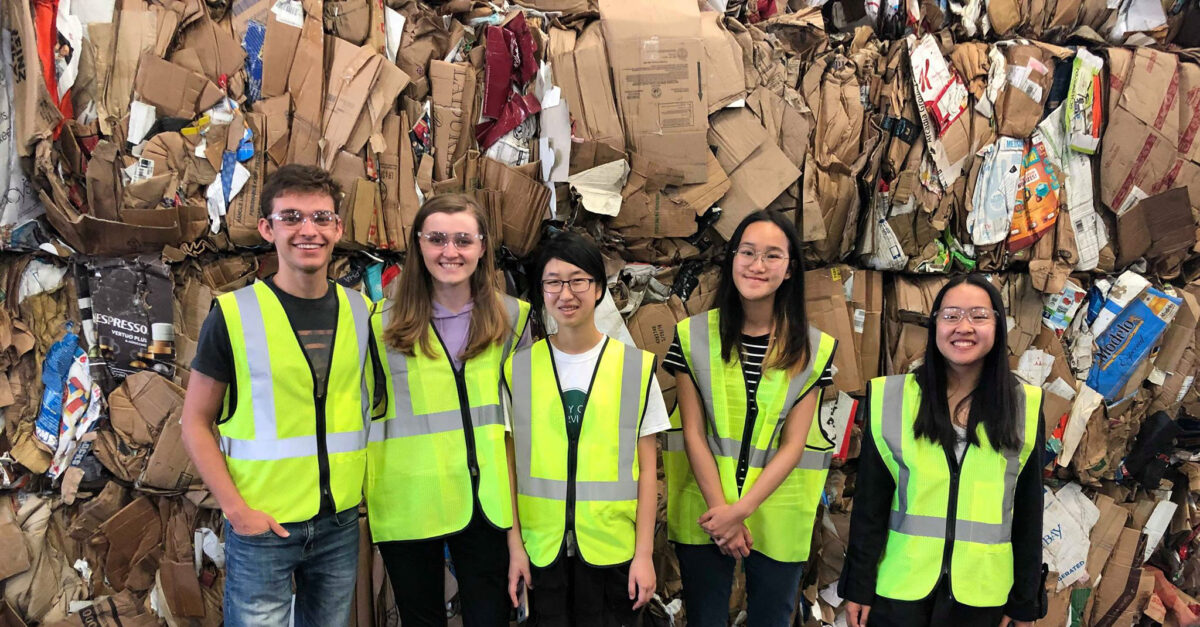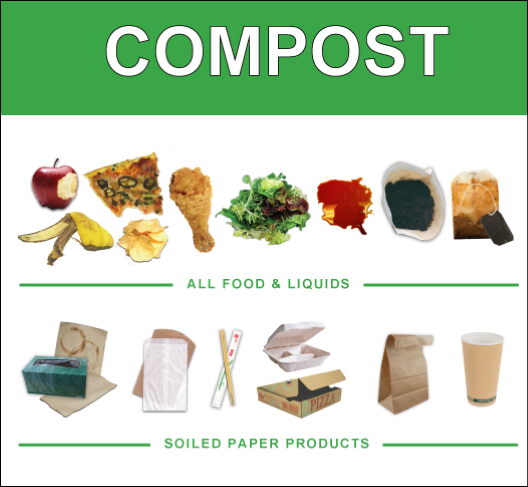
Find answers in our frequently asked questions about waste at UCLA
If your questions are not answered here or on the zero waste page, please direct any additional questions to zerowaste@ucla.edu. For questions regarding UCLA Health facilities, please visit UCLA Health Sustainability.
For help with managing hazardous waste, please visit UCLA EH&S Hazardous Waste. Visit our Specialty Recycling page for information on non-hazardous materials that need to be specially recycled/disposed.
Students and Los Angeles residents can visit the UCLA S.A.F.E Center to dispose of any personal universal, electronic, or hazardous waste.
For downloadable signage, please visit our Resources and Signage page.
All food and liquids, 100% fiber-based products (paper napkins, plates, bowls, bags, chopsticks, etc.), and green waste can be composted at UCLA.

Examples of accepted materials:
Food
- Fruit and vegetables, including scraps
- Meat, shells, dairy, and bones
- Spoiled or moldy foods
- Anything you would eat!
100% Fiber Based Products
- Cotton based coffee filters and tea bags
- Greasy pizza boxes
- Paper plates, bowls, cups (NO #7 PLA or compostable plastics)
- Paper take-out containers
Green Waste
- Flowers
- Coffee grounds and cotton filters
- Loose tea leaves
Paper, rigid plastics, metal, and glass can be recycled at UCLA. The items should not have food or liquid in it.

Examples of accepted materials:
Metal Cans & Foil
- Aluminum beverage cans and aluminum food cans (e.g. cat food, tuna cans)
- Steel/tin food and beverage cans
- Clean aluminum foil and foil food trays
Glass
- All glass bottles and jars (mayonnaise, apple juice bottles, wine bottles, etc.; NO dishes or ceramics)
- CA redemption bottles (beer, juice, wine coolers, etc.)
Plastics
- Hard plastic containers, preferably #1, 2, and 5 plastics (NO bags, plastic film, utensils, straws, black plastic containers, Styrofoam, EPS, #7, or #7 PLA)
- Water/juice/soda bottles
- Food containers and lids (yogurt cups, coffee cup lids, etc.)
- Milk and water jugs
- Detergent/cleaning product bottles
- Personal care bottles
- Plastic shopping bags (must be bundled together before recycling)
Paper
- Newspapers (including inserts)
- Mixed office papers (no laminated or glitter)
- Shredded paper (must be bagged)
- Corrugated cardboard boxes (must be broken down and flattened)
- Paper bags (no oil or grease)
- Magazines and catalogs
- Food/detergent boxes
- Junk mail, bulk mail, and scrap paper
- Paper bound with non-water soluble glue (paperback books, overnight mail packages, etc.); If you have large amounts of hardbound books, please submit an FSR
- Milk cartons (clean and rinsed)
- Aseptic/Tetrapaks (juice boxes and other pasteurized liquids)
The landfill bins are reserved for items that cannot be composted or recycled. Most commonly found are food/snack wrappers, plastic films, single-use plastics, plastic items smaller than a credit card, and mixed material products (made of multiple types of materials such as plastic and metal, paper and plastic, or some other combination that prevents recycling or composting).

Examples of landfill materials:
Mixed Material Products
- Foil-lined candy and snack wrappers
- Three ring binders
- Writing utensils (pens, pencils, markers, etc.)
Single-use items
- Coffee Pods
- Plastic cutlery (spoon, fork, knives)
- Plastic films (bags, cling wrap, zip-lock bags)
Other
- Personal Protective Equipment (gloves, face masks)
- Expanded Polystyrene (foam, Styrofoam)
- Chewing gum
For all UCLA-based waste sorting questions, please refer to UCLA’s waste hauler’s Waste Sorting Guide. Select “Business & Multi-Units 5+” as the Service Category and select “Los Angeles” for the City.
You can also use this site if Athens Services is your waste hauler in a different city.
For more information regarding LA County waste sorting, the L.A. County Department of Public Works has a table of recyclable items to help you!
Yes, if you have cardboard boxes for removal on campus, you must flatten and break down the boxes for servicing. If the boxes cannot fit into the recycling receptacle, neatly stack the flattened boxes in a pile and place them on the side of the recycling receptacle. If the boxes are not flattened, a Facilities Service Request (FSR) will be required.
Yes and no. Empty pizza boxes may be recycled only if they are clean. You can separate the lid from the greasy bottom section for recycling and compost the greasy part.
No, Styrofoam is unfortunately not recyclable. Most recycling facilities do not accept Styrofoam in their recycling programs because it is not feasible to recycle Styrofoam. Items are recyclable because 1) the product can be recycled into something new and 2) there is a market for the recycled product). However, the bulky but lightweight structure of Styrofoam and other similar foam products make the material hard to process and there is very little market for recycled foam products.
Please note that UCLA has a Packaging Foam Ban where university has prohibited the sale, procurement, and distribution of packaging foam as of Jan. 1, 2020. The ban applies systemwide, with the exception of laboratory or medical products. Learn more about our Sustainable Practices Policy.
You can send your CDs, DVDs, and empty ink toners/cartridges for recycling via Campus Mail Code 152608. Please label the packaging: “Facilities Management CDs/DVDs Recycling” or Facilities Management Printer Ink Recycling”. If you have 15+ toners or cartridges, please submit a Recycling Request Form here.
If you are a member of the community and not currently affiliated with UCLA, please visit the S.A.F.E. Center.
It is not required to do this, though it is preferred if there is a lot of food or grease. Drain liquids and scrape as much food out into a compost container (if available) or a landfill bin before recycling your container.




As long the item in question is a hard plastic item larger than a credit card, it is safe to dispose them in a recycling bin. Soft plastics, such as cling wrap and zip-top bags, are not recyclable. If it turns out that the plastic is not recyclable, it will simply be sorted out at the recycling facility.
The bottles are recycled in one way or another but to prevent the bottle caps from being lost during transportation, please keep the caps on.
Do not flatten aluminum cans before recycling, as this will make it difficult for sorting machinery to recognize and sort the cans.
Bioplastics and compostable plastics are not accepted in either the recycling bin or compost bin, as recycling facilities do not process these materials and these materials do not break down fast enough at industrial composting facilities. Please dispose bioplastics and compostable plastics in the landfill. UCLA is transitioning away from bioplastics and compostable plastics over the next year.
Single-stream is a fancy term for co-mingled or mixed recycling. Under this system, all recyclables can be placed into the same bin. They are then sorted on the back end by a waste management or recycling company. This “single-stream” is simpler and more convenient for the individual. It is highly effective and is used by many communities, schools, and businesses around the world. Using a single-stream system will help UCLA reach its 90% waste diversion goals.
There can be some additional contamination, but the increase in recycling collection makes up for it. Food and liquids are what causes “contamination” of recyclables and they should not be placed into the mixed recycling bins.
It’s important to recycle as landfill space is limited and so are our planet’s resources. This means trash will have to be trucked further and further away if we reach capacity with our current landfills. In addition, more raw materials such as precious metals or trees will be required if we do not promote a circular economy.
Recyclables are collected on campus from the recycling bins, and then taken to a Materials Recovery Facility (MRF) in Sun Valley where they are sorted. From there, they are bundled and sold as commodities to be made into new products. Where exactly they go depends on the current market demand. You can watch a virtual tour of the MRF.
Our waste hauler accepts compostable waste and preliminarily sorts contaminants at a Materials Recovery Facility before bringing it to their organics processing facility. You can watch a virtual tour of the American Organics facility if you are interested in learning more. UCLA has widely expanded access to compost bins throughout campus and will have compost collection in all campus buildings by the end of 2020.
Facilities will provide recycling bins for public spaces only (corridors, hallways, and classrooms). Departmental space such as office suites and labs will need to purchase their own receptacles. If you need a battery bin, please fill out the Recycling Request Form.
You can contact your building manager about receiving recycling and/or composting services from your waste hauler. The L.A. County Recycling Ordinance in addition to State Policy SB1383 mandates all waste haulers to provide these services, it also allows these haulers to charge a fee, but this fee is usually only between $0.50-$3.00 per month.
The Community Programs Office (CPO) Food Closet provides donated food to feed hundreds of UCLA students facing food insecurity and financial hardship. If you would like to donate, please follow our Food Recovery Implementation Guide.
